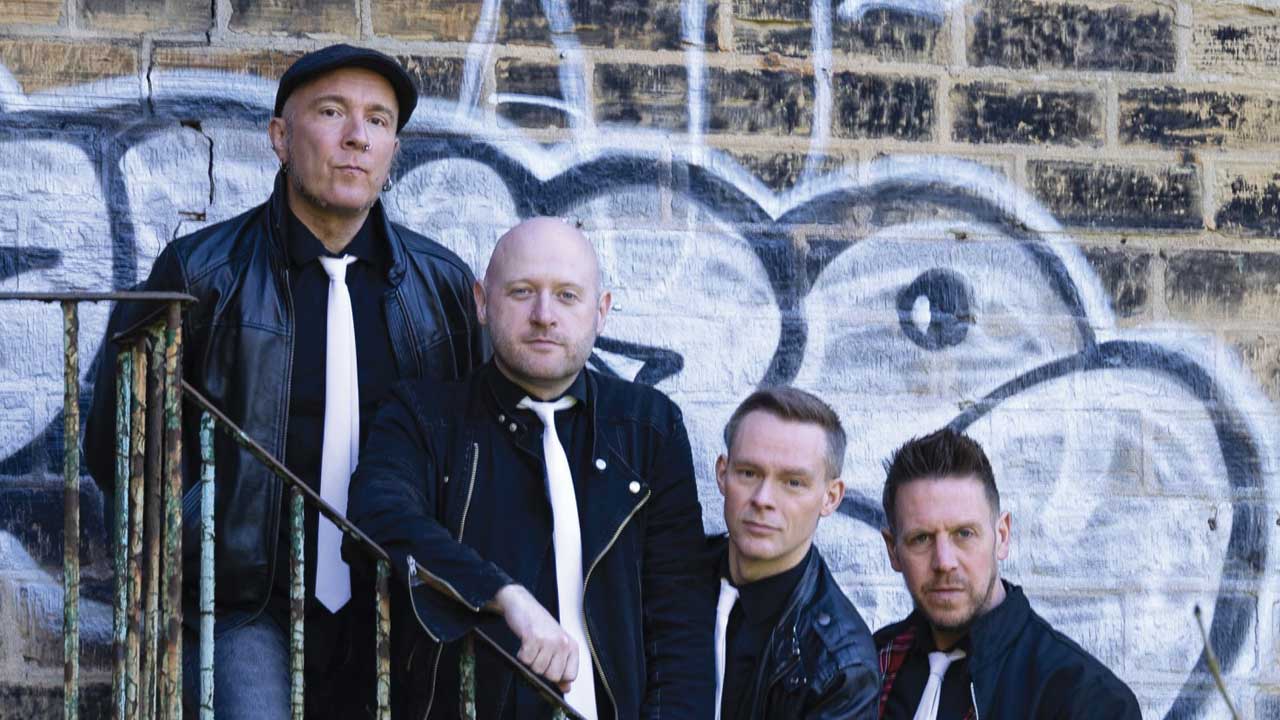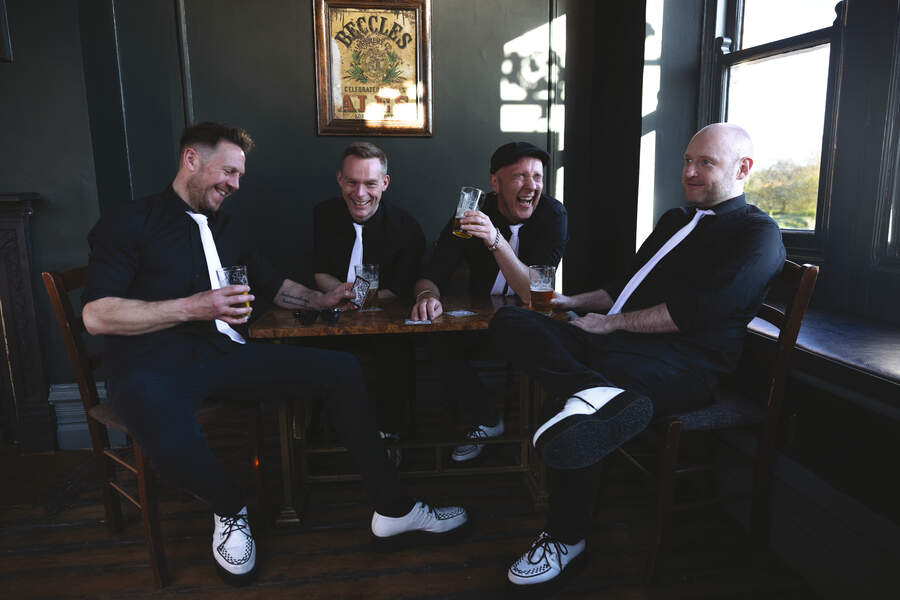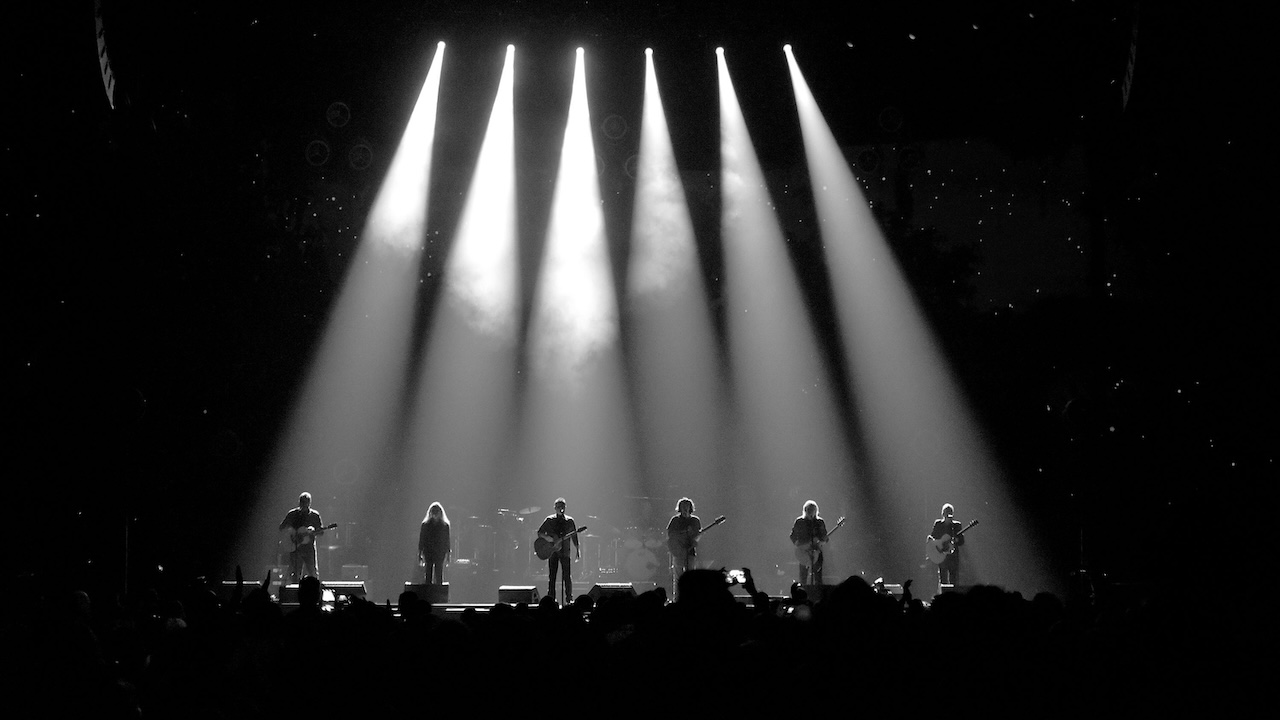After six years as a Nameless Ghoul in Ghost, Chris Catalyst just wants to play with his mates
The new album by Eureka Machines, Everything, is the band's first in seven years

Select the newsletters you’d like to receive. Then, add your email to sign up.
You are now subscribed
Your newsletter sign-up was successful
Want to add more newsletters?

Every Friday
Louder
Louder’s weekly newsletter is jam-packed with the team’s personal highlights from the last seven days, including features, breaking news, reviews and tons of juicy exclusives from the world of alternative music.

Every Friday
Classic Rock
The Classic Rock newsletter is an essential read for the discerning rock fan. Every week we bring you the news, reviews and the very best features and interviews from our extensive archive. Written by rock fans for rock fans.

Every Friday
Metal Hammer
For the last four decades Metal Hammer has been the world’s greatest metal magazine. Created by metalheads for metalheads, ‘Hammer takes you behind the scenes, closer to the action, and nearer to the bands that you love the most.

Every Friday
Prog
The Prog newsletter brings you the very best of Prog Magazine and our website, every Friday. We'll deliver you the very latest news from the Prog universe, informative features and archive material from Prog’s impressive vault.
It’s 5pm on a Bank Holiday weekend. Central London is sunny and packed. Eureka Machines have piled into an old Soho boozer (about the only one without football crowds, or Sunday roasts flying overhead) ahead of their gig at the 100 Club later, when Chris Catalyst has a revelation. The sort that tend to come near the end of your first pint, as you contemplate a second round, surrounded by people who’ve known you for ever.
“I think pissing around is really important,” the frontman/songwriter-in-chief declares between sips of stout. “I’ve got a friend who goes to [male suicide prevention charity] Andy’s Man Club, and he says it’s been fantastic, because as he got older, and people started having kids, getting married and working away and that kind of thing, his social circle really got smaller. So having this, to get together with your mates and piss about, I think it’s important.”
He finishes solemnly, gesturing to his bandmates: “And we do a massive amount of pissing about.”
Dressed in a flat cap, hoodie, and T-shirt with ‘Northern’ across the chest, silver rings weighing down his earlobes, Chris is chatty without being domineering. Part Ginger Wildheart (but sweeter), part John Cooper Clarke (a 21st-century Yorkshire version), he has the gently ‘wired’ manner of someone without a real off-switch. It’s easy to picture him in his local back in Leeds, pint to hand, quietly noting down things he overhears. Invariably, there’s a good chance they’ll end up in his next song.
“I spend a lot of time in the pub,” he says thoughtfully, “especially living in Leeds, people are just funny. There’s always someone funnier than you in the pub. I find this all the time. It’s that realness.”
Much of that realness comes out in the tragicomic pearls of Eureka Machines’ new album Everything. There are stirring harmonies. On-the-nose kitchen-sink poetry. Melodies that hit hard, with juicy twists that hit even harder. Full of emotionally nuanced pop-rock bangers and ballads, it’s their first collection in eight years – following a gap brought on by the pandemic, life events and Catalyst’s touring commitments as a Nameless Ghoul in Ghost, with whom he played for six years.
While his other guises veer into heightened territory (he still plays guitar with the Sisters Of Mercy and Ugly Kid Joe, as well as being a prolific solo artist), Eureka Machines keep it very real. They formed in Leeds as 20-somethings and remain the best of friends. Bassist Pete Human, bald and straight-faced in his leopard print shirt, is a senior buyer for an IT company. Hench, tattooed drummer Wayne Insane drives a forklift truck at the pet-food warehouse he manages.
Sign up below to get the latest from Classic Rock, plus exclusive special offers, direct to your inbox!
“And I work for a digital transformation consultancy,” blond, Nirvana-T-shirted guitarist Dave/‘Davros’ says, joining in.
What’s that like?
“It’s not as fun as this…”
With limited time together, the emphasis is on making that time count. At this stage, there’s a shared acceptance of what Eureka Machines can (and can’t) be. Everyone has other priorities, family commitments (Dave and Wayne both have children), and day jobs.
In order to work around these things flexibly, their cottage industry set-up is relatively self-sufficient. They mostly gig at weekends. They stay in old friends’ spare rooms and Airbnbs in different towns. They don’t answer to anyone but themselves. It’s reaped a niche but extremely passionate audience, with fans coming to gigs from across the country, Germany, the US and even Japan.
“We’re lucky, because it didn’t just happen,” Dave reasons. “In our twenties, we worked our arses off. We were out all the time because we didn’t have ‘proper jobs’ or whatever, getting in at four or five in the morning, getting up at eight or nine o’clock. We did that a lot, and we built up the fan base.”
“This is only ever going to be what it is, if that makes sense,” Chris adds. “I can’t really intellectualise it. It just sort of works alongside our other lives. And I sometimes wonder, if something did happen, and we could all just do this full time, would it just become another job?”

At this point, day jobs and DIY operations are typical for the overwhelming majority of rock bands. With all Eureka Machines’ releases, publicity, videos, tour logistics etc arranged in-house, they are about as DIY as it gets. But they seem happier doing it than many.
On this latest tour they played the smallest stage of their career (“officially it was three hundred-cap,” Chris says, “but I’m fucked if I know where you’d put three hundred people there”) and had the best time doing it. Every night a stranger in the crowd has bought them pints. Tonight at the 100 Club it’ll be a girl called Grace. Chris will dub her “the fifth member” and declare: “I love being in this band”.
Having a supportive inner circle helps keep shoestring tours fun, and Eureka Machines are no exception. Chris’s lodger Rob is manning the merch desk. Old mates Tropical Contact are the support band. They change their own guitar strings (Chris used to be a guitar tech for Skid Row, Maximo Park and Ugly Kid Joe) and normally drive their van, although a friend drove them down tonight, allowing them to have a couple of pints with us.
On top of all that they’ve kept ticket prices low. It’s bitten them in the arse financially, but all agree it’s worth it. “Everybody’s skint,” Chris reasons, with the uncomplicated empathy of a total nonbusinessman. “Venues are struggling, bands are struggling, and it’s because people are struggling. So I was like: ‘We’ll try to make it affordable’.”
It’s a change of pace from his arena-playing, pyro-heavy days with Ghost, with whom he parted ways in 2023 – having been (his words on social media at the time) “binned off by email”. Today he’s admirably philosophical about the whole thing, an additional layer of thick skin seemingly acquired.
“It was a job,” he reflects, levelly. “Everything I do, I’m fucking all in. I thought, and continue to think, that’s a good way to live your life. However, I think that with certain jobs, there needs to be an acceptance that things are transitory, and things can change… I’m like, ‘I’m all in’, and I was all in with that, but it turns out that that’s not how they operate the business, and that’s okay. I’m no longer mad at that, but it’s hard finding that out.”
He shrugs. A pang of hurt passes through him, but only for a second. “But you know, it’s all part of life’s rich tapestry. I hope for their sakes and for the people that follow them – they’ve got such an amazing fan base – that they’re all still really enjoying it, and it seems like they’re smashing it. I’m still close with people in the band that I was close with, for the most part.”
The title track of Everything taps into feelings that sprang from that time. An ode to letting go, and the beauty of the bigger picture, ‘the constant spinning of the wheel’. The grounding, restorative effect he gets from this band, with its promise of good times, good friends. When Ghost opened for Iron Maiden in 2017, Chris watched the headliners arrive (and depart) in separate, blacked-out limos. The image has stayed with him.
“When we’re not touring, we’ll be texting each other about the snooker, or stupid bands that we found or whatever,” he says, as last drinks are finished. “But there’s plenty of bands that I know [who] don’t have that. And that’s okay, but that wouldn’t be for us.”
The 100 Club is busy and boiling by the time Eureka Machines, headlining, dive into a scorching opener trio of Everything, Scream Eureka and should-have-been-a-megahit Pop Star. Sharp-suited. Loose but laser-focused. For all the things Eureka Machines don’t take too seriously (chiefly themselves), when it comes to performing – and to producing songs that resonate deeply – they couldn’t be more sincere.
“It’s clichéd to say it,” Chris said earlier, “but there’s so much… bad stuff happening in the world that these gigs have become a haven from that. And I think people see gigs more like that these days. It’s our own little ‘safe space’, where everyone can just be themselves and have a nice time and forget about all the other bollocks.”
“And we are mates. It’s important with a band,” Wayne says. “I think it comes across in what you do. It’s the way it should be, but obviously it’s not always.”
During the set, we can’t help watching the drummer, a commandingly expressive player. You can read the joys, high jinks and emotional depths of this music, this way of life, on his face. He gigs in a covers band on weekends, alongside Eureka Machines. Dave has a project in the works with another singer. Pete plays on Chris’s solo music. Passion projects with ripples that penetrate a wider circle, making some lives a little brighter.
“What power have we got, individually, collectively, to just make our days a bit better? And the days of people around us?” Chris mused. “I think what we’re quite good at is having these little tunes, at these gigs, that give people a couple of hours to get out of their heads. The human experience is fucking hard. And as we get older, things get harder. I certainly feel things more.”
“Sometimes it’s not just the audience to escape from themselves,” Dave added. “It’s us as well. Like when we’re on stage, I think of nothing else. I get out of my own head, and I feel like it’s a reciprocal thing – there’s a relationship there, and it’s really important that that exists, for me.”
There’s talk of touring again this year, and “maybe not waiting another seven, eight years to do a new album”. Goodwill and support are plentiful, even if resources are scant. At the end of tonight’s gig, they’ll load out their own gear. Profits will be sparse. Luck permitting, there’ll be enough for a curry back home in Leeds.
And yet to regard Eureka Machines as anything other than a great success – if success is measured in happiness – wouldn’t feel right. Great music and good times with real friends. Pissing about. Caring enormously. Making good art. Finding joy in what you do, regardless of who’s watching. This is what success looks like.
Everything is out now via Wrath Records.

Polly is deputy editor at Classic Rock magazine, where she writes and commissions regular pieces and longer reads (including new band coverage), and has interviewed rock's biggest and newest names. She also contributes to Louder, Prog and Metal Hammer and talks about songs on the 20 Minute Club podcast. Elsewhere she's had work published in The Musician, delicious. magazine and others, and written biographies for various album campaigns. In a previous life as a women's magazine junior she interviewed Tracey Emin and Lily James – and wangled Rival Sons into the arts pages. In her spare time she writes fiction and cooks.
You must confirm your public display name before commenting
Please logout and then login again, you will then be prompted to enter your display name.



